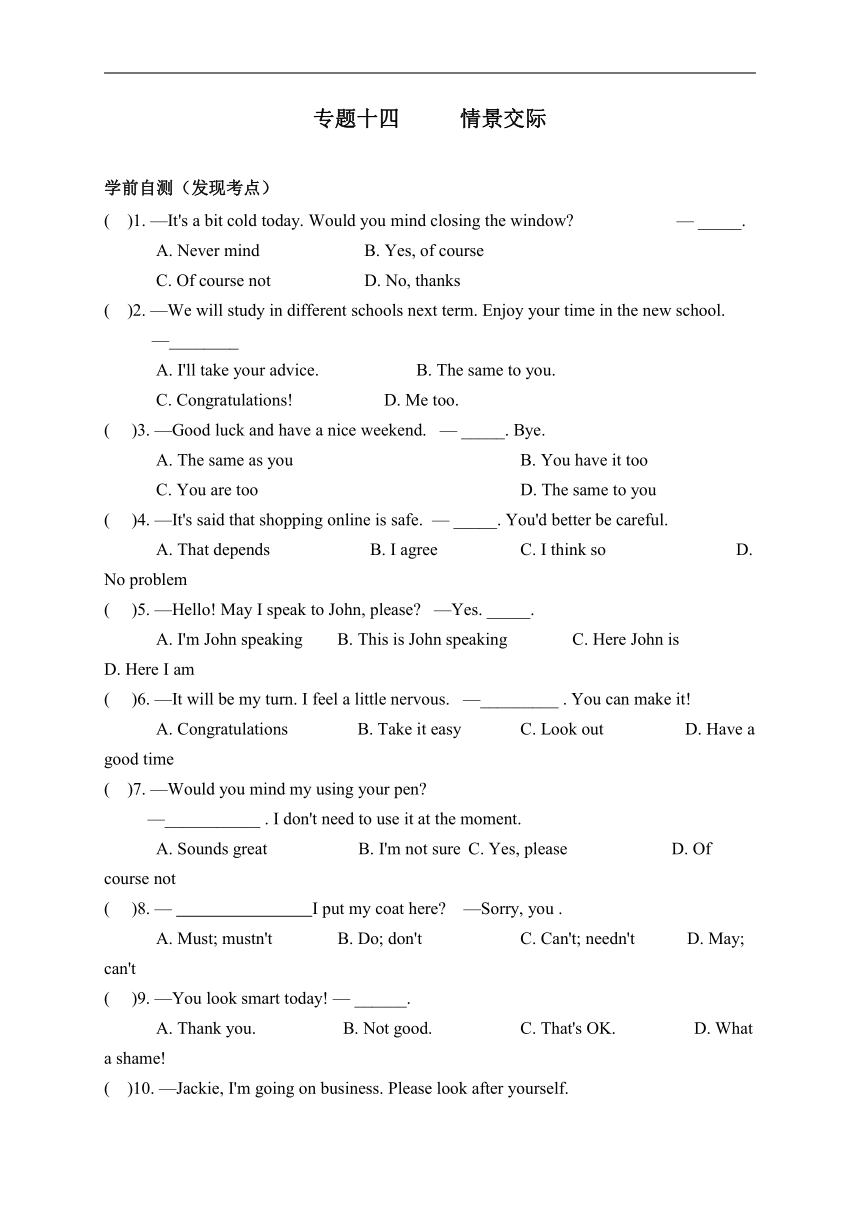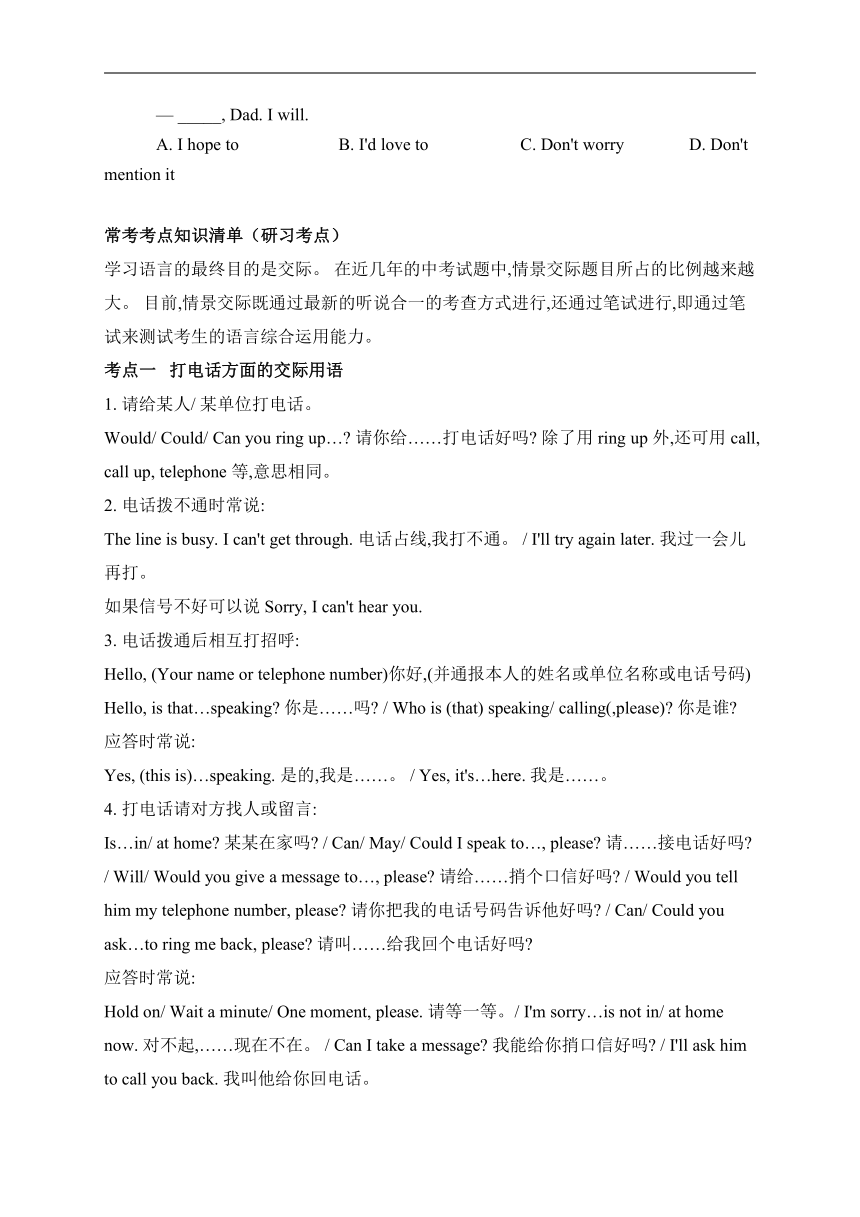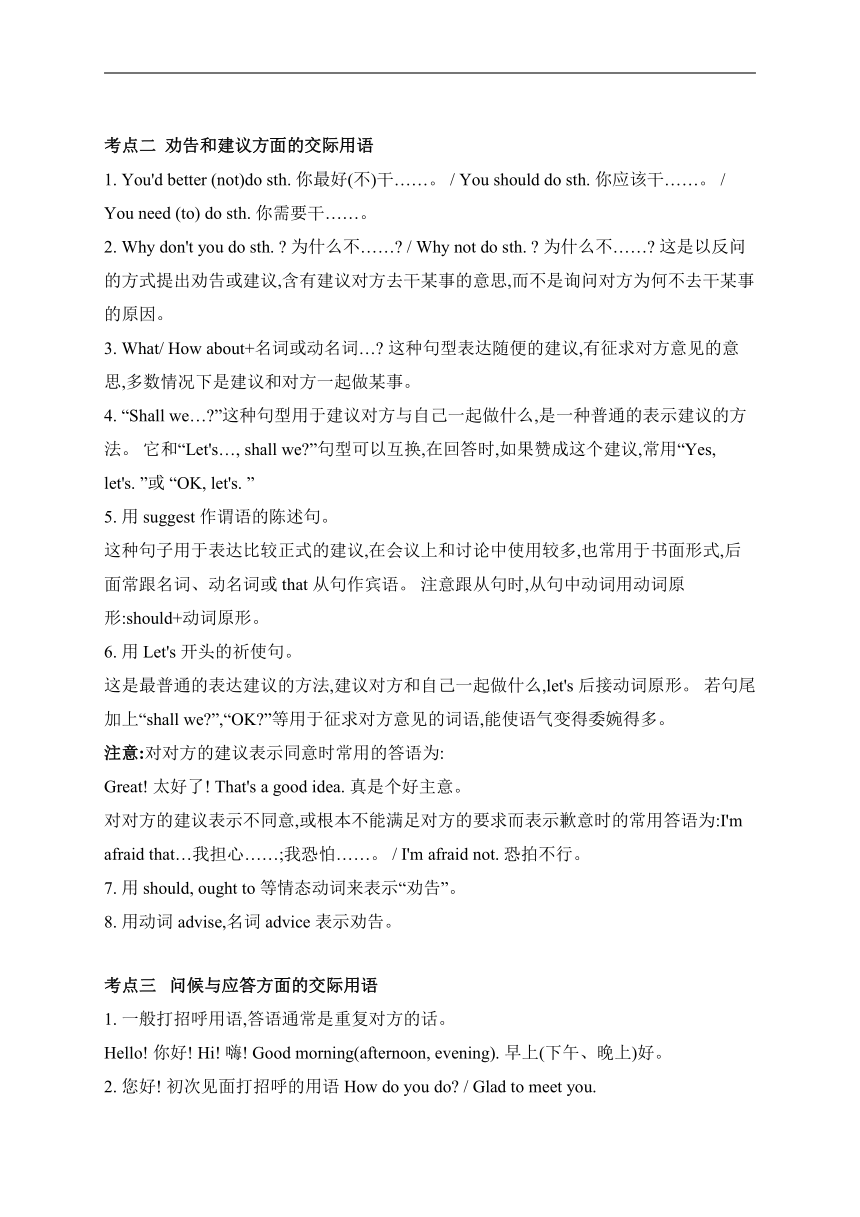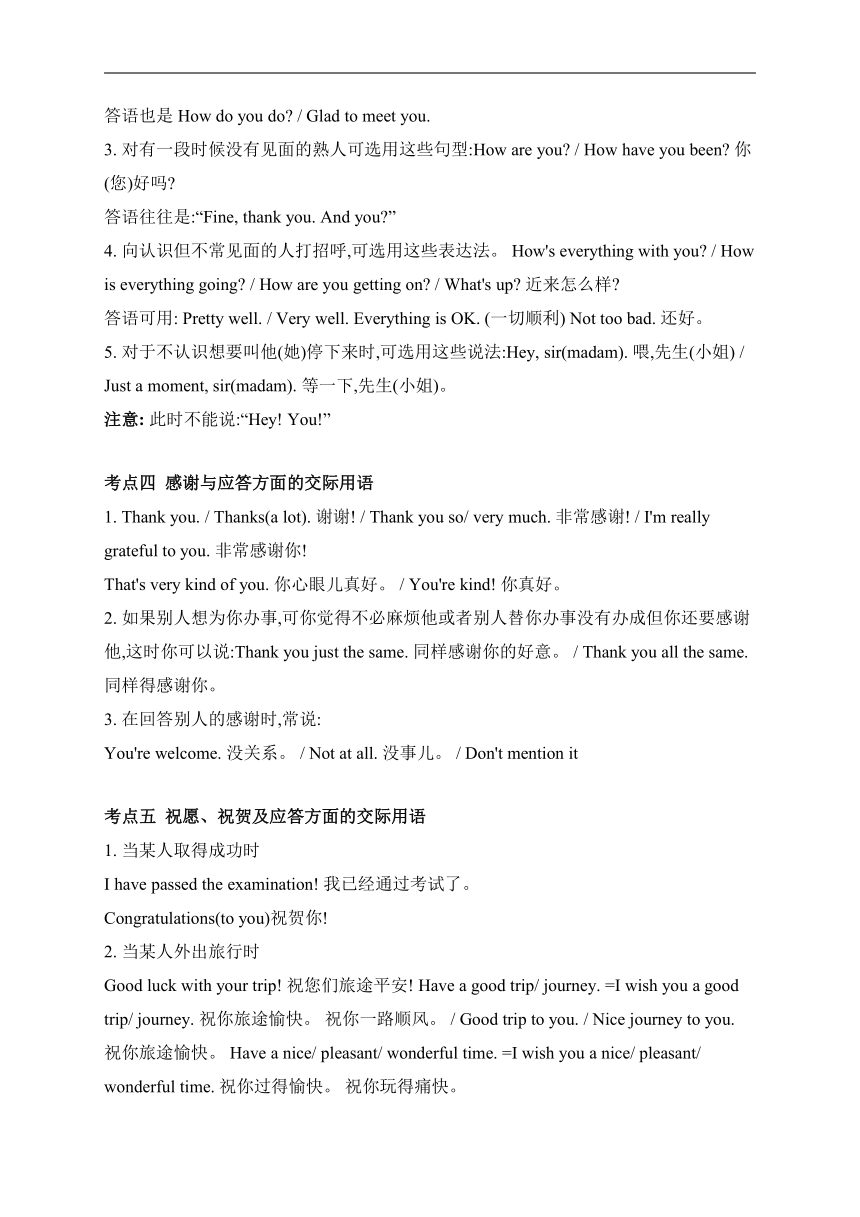2020年中考英语基础语法专练十四 情景交际 (含答案)
文档属性
| 名称 | 2020年中考英语基础语法专练十四 情景交际 (含答案) |

|
|
| 格式 | zip | ||
| 文件大小 | 27.7KB | ||
| 资源类型 | 教案 | ||
| 版本资源 | 通用版 | ||
| 科目 | 英语 | ||
| 更新时间 | 2020-02-23 00:00:00 | ||
图片预览




文档简介
专题十四 情景交际
学前自测(发现考点)
( )1. —It's a bit cold today. Would you mind closing the window? — _____.
A. Never mind B. Yes, of course
C. Of course not D. No, thanks
( )2. —We will study in different schools next term. Enjoy your time in the new school.
—________
A. I'll take your advice. B. The same to you.
C. Congratulations! D. Me too.
( )3. —Good luck and have a nice weekend. — _____. Bye.
A. The same as you B. You have it too
C. You are too D. The same to you
( )4. —It's said that shopping online is safe. — _____. You'd better be careful.
A. That depends B. I agree C. I think so D. No problem
( )5. —Hello! May I speak to John, please? —Yes. _____.
A. I'm John speaking B. This is John speaking C. Here John is D. Here I am
( )6. —It will be my turn. I feel a little nervous. —_________ . You can make it!
A. Congratulations B. Take it easy C. Look out D. Have a good time
( )7. —Would you mind my using your pen?
—___________ . I don't need to use it at the moment.
A. Sounds great B. I'm not sure C. Yes, please D. Of course not
( )8. — I put my coat here? —Sorry, you .
A. Must; mustn't B. Do; don't C. Can't; needn't D. May; can't
( )9. —You look smart today! — ______.
A. Thank you. B. Not good. C. That's OK. D. What a shame!
( )10. —Jackie, I'm going on business. Please look after yourself.
— _____, Dad. I will.
A. I hope to B. I'd love to C. Don't worry D. Don't mention it
常考考点知识清单(研习考点)
学习语言的最终目的是交际。 在近几年的中考试题中,情景交际题目所占的比例越来越大。 目前,情景交际既通过最新的听说合一的考查方式进行,还通过笔试进行,即通过笔试来测试考生的语言综合运用能力。
考点一 打电话方面的交际用语
1. 请给某人/ 某单位打电话。
Would/ Could/ Can you ring up…? 请你给……打电话好吗? 除了用 ring up 外,还可用 call, call up, telephone 等,意思相同。
2. 电话拨不通时常说:
The line is busy. I can't get through. 电话占线,我打不通。 / I'll try again later. 我过一会儿再打。
如果信号不好可以说 Sorry, I can't hear you.
3. 电话拨通后相互打招呼:
Hello, (Your name or telephone number)你好,(并通报本人的姓名或单位名称或电话号码)
Hello, is that…speaking? 你是……吗? / Who is (that) speaking/ calling(,please)? 你是谁?
应答时常说:
Yes, (this is)…speaking. 是的,我是……。 / Yes, it's…here. 我是……。
4. 打电话请对方找人或留言:
Is…in/ at home? 某某在家吗? / Can/ May/ Could I speak to…, please? 请……接电话好吗? / Will/ Would you give a message to…, please? 请给……捎个口信好吗? / Would you tell him my telephone number, please? 请你把我的电话号码告诉他好吗? / Can/ Could you ask…to ring me back, please? 请叫……给我回个电话好吗?
应答时常说:
Hold on/ Wait a minute/ One moment, please. 请等一等。/ I'm sorry…is not in/ at home now. 对不起,……现在不在。 / Can I take a message? 我能给你捎口信好吗? / I'll ask him to call you back. 我叫他给你回电话。
考点二 劝告和建议方面的交际用语
1. You'd better (not)do sth. 你最好(不)干……。 / You should do sth. 你应该干……。 / You need (to) do sth. 你需要干……。
2. Why don't you do sth. ? 为什么不……? / Why not do sth. ? 为什么不……? 这是以反问的方式提出劝告或建议,含有建议对方去干某事的意思,而不是询问对方为何不去干某事的原因。
3. What/ How about+名词或动名词…? 这种句型表达随便的建议,有征求对方意见的意思,多数情况下是建议和对方一起做某事。
4. “Shall we…?”这种句型用于建议对方与自己一起做什么,是一种普通的表示建议的方法。 它和“Let's…, shall we?”句型可以互换,在回答时,如果赞成这个建议,常用“Yes, let's. ”或 “OK, let's. ”
5. 用 suggest 作谓语的陈述句。
这种句子用于表达比较正式的建议,在会议上和讨论中使用较多,也常用于书面形式,后面常跟名词、动名词或 that 从句作宾语。 注意跟从句时,从句中动词用动词原形:should+动词原形。
6. 用 Let's 开头的祈使句。
这是最普通的表达建议的方法,建议对方和自己一起做什么,let's 后接动词原形。 若句尾加上“shall we?”,“OK?”等用于征求对方意见的词语,能使语气变得委婉得多。
注意:对对方的建议表示同意时常用的答语为:
Great! 太好了! That's a good idea. 真是个好主意。
对对方的建议表示不同意,或根本不能满足对方的要求而表示歉意时的常用答语为:I'm afraid that…我担心……;我恐怕……。 / I'm afraid not. 恐拍不行。
7. 用 should, ought to 等情态动词来表示“劝告”。
8. 用动词 advise,名词 advice 表示劝告。
考点三 问候与应答方面的交际用语
1. 一般打招呼用语,答语通常是重复对方的话。
Hello! 你好! Hi! 嗨! Good morning(afternoon, evening). 早上(下午、晚上)好。
2. 您好! 初次见面打招呼的用语 How do you do? / Glad to meet you.
答语也是 How do you do? / Glad to meet you.
3. 对有一段时候没有见面的熟人可选用这些句型:How are you? / How have you been? 你(您)好吗?
答语往往是:“Fine, thank you. And you?”
4. 向认识但不常见面的人打招呼,可选用这些表达法。 How's everything with you? / How is everything going? / How are you getting on? / What's up? 近来怎么样?
答语可用: Pretty well. / Very well. Everything is OK. (一切顺利) Not too bad. 还好。
5. 对于不认识想要叫他(她)停下来时,可选用这些说法:Hey, sir(madam). 喂,先生(小姐) / Just a moment, sir(madam). 等一下,先生(小姐)。
注意: 此时不能说:“Hey! You!”
考点四 感谢与应答方面的交际用语
1. Thank you. / Thanks(a lot). 谢谢! / Thank you so/ very much. 非常感谢! / I'm really grateful to you. 非常感谢你!
That's very kind of you. 你心眼儿真好。 / You're kind! 你真好。
2. 如果别人想为你办事,可你觉得不必麻烦他或者别人替你办事没有办成但你还要感谢他,这时你可以说:Thank you just the same. 同样感谢你的好意。 / Thank you all the same. 同样得感谢你。
3. 在回答别人的感谢时,常说:
You're welcome. 没关系。 / Not at all. 没事儿。 / Don't mention it
考点五 祝愿、祝贺及应答方面的交际用语
1. 当某人取得成功时
I have passed the examination! 我已经通过考试了。
Congratulations(to you)祝贺你!
2. 当某人外出旅行时
Good luck with your trip! 祝您们旅途平安! Have a good trip/ journey. =I wish you a good trip/ journey. 祝你旅途愉快。 祝你一路顺风。 / Good trip to you. / Nice journey to you. 祝你旅途愉快。 Have a nice/ pleasant/ wonderful time. =I wish you a nice/ pleasant/ wonderful time. 祝你过得愉快。 祝你玩得痛快。
3. 当某人生日时
—Happy birthday to you! 生日快乐! —Thank you! 谢谢!
4. 当某人即将做某事时
—I will take the exams tomorrow. 我明天将参加考试。
—Good luck (to you)! (I wish you success!)祝您顺利! (祝您成功!)
注意:上述几点中祝愿(贺)的回答可用: Thanks/ Thank you / Thanks a lot. 或 It's kind of you to say so. 谢谢。 / 多谢。 / 谢谢您。 / 谢谢你这么说。
5. 在公共节日里
—Happy New Year(to you)! 新年快乐! / Merry Christmas!
—Thanks. The same to you! (Happy New Year to you, too!)谢谢! 您也一样! (也祝您新年快乐!)
考点六 请求允许和应答方面的交际用语
1. Can I/ Could I/ May I…? 我可不可以……?
这个是请求对方允许自己做某事的最普通的交际用语,其中 Could I…? 语气最婉转;May I…? 常用在比较正式的场合;Can I…? 用得最广泛。
对于所提出的请求表示允许或同意时,可说:Yes. / Sure. / Certainly. 当然可以。 Of course, you may. 当然可以。Yes, do please. 请吧。 Go ahead, please. 请吧。 That's OK. / All right. 好的。
对于所提出的请求表示不允许或不同意时,可说:No, pleased don't. 请不要。 I'm sorry you can't. 对不起,你不可以……。 I'm sorry, but…对不起,但是…。 You'd better not…你最好别……。
2. Do you mind if I do…? 如果我干某事,你反对/ 介意吗?”或“我干某事,好吗?”
这是用来表示“请求许可”的交际用语。 句中的 mind 作“介意”、“反对”解。
注意:当我们用“Do you mind if…”时,if 从句中的谓语动词一般用现在时;当我们用“Would you mind if…”时,if 从句中的谓语动词一般用过去时,这时语气更加婉转。
应答时,如果表示“允许/ 不介意”,常说:No, I don't mind. 我不介意/ 我允许。 Certainly not / Of course not. 当然不介意。 No, go ahead. 不介意,你干吧。 / Not at all. 一点也不介意。
如果表示“不允许/ 介意”时,常说:I'm sorry you can't…很抱歉,你不能……。 / I'm afraid…恐怕……。 / I'm afraid it's not allowed. 恐怕这是不允许的。
3. I wonder if I could/ can…? 我想知道我能否……?
这也是用来表示“请求许可”的交际用语。 句中的 wonder 作“想知道”解,后面常跟 if 从句,用以委婉地提出请求。
应答时,如果允许,常说:Sure, go ahead. / Yes, please do. 可以,请吧。 Yes. / Of course. / Certainly. 当然可以。
如果不允许,可以说:I'm sorry, but…对不起,……。 / I'm afraid not. 恐怕不行。 / No, please don't. 请不要 ……。 / You'd better not…你最好别……。
考点七 请求与应答方面的交际用语
1. 用 may(can, could)来表达。
表示同意请求的应答:Yes, you may(can). 是的。 / Certainly. ( =Of course. / Sure. )当然可以。 / Yes, do please.好的,请吧。
注意:上述回答中 can 不能换成 could 因为 could 在一般疑问句中表示委婉的请求,而在肯定句中,则无此功能。
表示不同意请求的应答:No, you mustn't. 不可以。 / No, you can't. 不能。 No, you'd better not. 你最好不这样。 / Please don't. 请不要这样。 / Sorry, I'm afraid not. 对不起,恐怕不能。
2. 用 shall 来表达
表示同意的请求应答:Yes, I'd like to. 好的,我愿意。 / All right. / OK. 好的。 / (That's a)Good idea. 好主意。 /Yes, Let's…好的,让我们走吧。
表示不同意请求的应答:Please don't. 请不要这样。 / I don't think so. 我认为不要这样。 / I'm afraid not. 恐怕不能。
3. 用 Would(Will)you please…? / Would you like…? 来表达。
表示同意请求的应答:Yes, I'd like to. / Yes, I'd love to. / Yes, I'll be glad to. 是的,我愿意。 / With pleasure. 十分愿意。
注意: 上述回答中介词 to 均不能省略。
表示不同意请求的应答:I'd like (love) to, but I'm busy. 我很想,但我很忙。 / I'm sorry, but I'm busy. 对不起,我很忙。 / I'm afraid not. 恐怕不能。 / I'd really like to, but I have no time. 我的确很愿意,可我没时间。
4. 用 please 来表达。
表示同意请求的应答:OK. / All right. 好的。 / Of course. / Sure. / Certainly. )当然可以。 / With pleasure. 十分愿意。
表示不同意请求的应答:I'm sorry, but I'm busy. 对不起,我很忙。 / I'm afraid not. 恐怕不行。
考点八 邀请与应答方面的交际用语
1. 用一般疑问句形式
Will / Would / Can / Could you come to…? 是被邀请人接受的可能性较大。 表示“请您来……好吗?”例如:
Will you come to take part in my party? 你来参加我的聚会好吗?
Would you like +名词(代词) / 不定式/ sb. +不定式? 此句型表示“您愿意……? 或你是否愿意……?”,此时邀请人不知对方是否接受邀请,是商量、询问及试探性的邀请、请求或表示个人的想法、看法。 例如:
—Would you like to go there with him? 你愿意与他一道去那儿吗?
—Yes, I'd like(love) to 好的,我愿意。 (类似肯定表达法:Yes, I'd be happy to. 好的,我很乐意。 / Yes, it's very kind / nice of you to invite me. 好的,谢谢您邀请我。 / Yes, it's very kind of you. 真是太好了,谢谢。)
2. 用陈述句形式
I like sb. to do sth. / I'd like you to come to…这是向某人发出邀请的常见句式。 表示“希望(想叫)某人做某事”,常与 would 连用,是一种客气的邀请。 例如:
—I'd like to invite you to see a film with me. 我想请你和我一起去看电影。
—I'd like(love) to, but I'm very busy. 我很想,但我很忙。 (类似委婉拒绝表达法:I'd love to…I'm afraid…我想去,恐怕……。 / Thank you for inviting me, but…谢谢你的邀请,但是……/ It's very kind of you to invite me, but I'm busy. 谢谢你邀请我,但我很忙。)
考点九 问路及应答方面的交际用语
1. 问路时,首先说“Excuse me. ”意思是“请原谅”、“请问”、“劳驾”,表示因为打扰而道歉,然后再问路,应答时可根据实际情况回答。
2. 常用的有以下几种表达:
Excuse me. Can you tell me the way to…? 劳驾,请告诉我去……(地方)怎么走? / Excuse me. How can I get to…? 劳驾,怎样去……(地方)? / Excuse me, please, where is…? 劳驾,请问去……的路怎么走? / How far is it from here? 它离这里多远?
回答常常有:It's about…metres from here. 它离这里大约……米远。 / It's about…yards/ meters down this street. /Go straight ahead till you see…沿着这条街走约……米就到了。 / Go straight ahead till you see…照直走到……(地方)为止。 / Go down/ along this street. 沿着这条街走下去。 / Take this street/ road. 走这条街/ 大路。 / Go through the gate and you'll find the entrance to…穿过大门,你就会看到……的入口处。 / Go down/ along this street till you get to…沿着这条街走到……(地方)为止。 / Turn right/ left at the first/ second crossing. 在第一/ 二个十字路口向右/ 左转。 / You'd better take a taxi/ No. 5 Bus…你最好坐出租车/ 乘 5 路公共汽车。
考点十 就餐方面的交际用语
1. 就餐时,当主人询问客人想吃/ 喝点什么时,主人常说:Would you like sth. (to eat / to drink)? 你想吃/ 喝点……吗? / What would you like (to have)? 你想要吃点什么? / Would you like some more…? 你还要点……吗? / How about (some more)…? (再)来点……怎么样?
2. 就餐时,当主人主动请客人吃/ 喝点东西时,主人常说:Help yourself to…? 你吃/ 喝点……吧。 / Let me give you…? 让我给你拿点……吧。 / Make yourself at home. 请随便吃,不要客气。
3. 当客人表示愿意或同意吃/ 喝点东西时,常回答:Yes, please. 好的。 / I'd like…我想来点……。 / Well, just a lit-tle, please. 好的,请来一点儿。
4. 当客人表示不想吃/ 喝东西或表示已经吃饱/ 喝好了时,常回答:No, thanks. 谢谢,不要了。 / Thank you, I've had enough. 谢谢,我已经吃/ 喝够了。 / I'm full, thank you. 谢谢,我吃饱了。
巩固训练(夯实基础)
一、单项选择
( )1. —Excuse me, I can't find my seat. Could you help me, sir?
— _____. May I see your ticket, please?
A. It doesn't matter B. Great C. I can't D. Sure
( )2. —Would you like to have dinner with me, Jane?
— ____. But I'm busy revising for my English exam.
A. Don't mention it B. I'd love to C. That's all right D. My pleasure
( )3. —Hello, may I speak to Lily, please? — _____.
A. Yes, he is B. Good idea
C. Speaking D. Fine
( )4. —You'd better not eat too much chocolate. It's bad for your health. — ____.
A. It's a joke B. You're welcome
C. It doesn't matter D. Thanks for your advice
( )5. —I'm going to have a trip to South Korea this summer holiday. — ____.
A. Enjoy yourself B. I agree C. Thank you D. Good luck
( )6. —Would you mind opening the window? — _____. It's raining outside.
A. Of course not B. You'd better not C. I have no idea D. It's up to you
( )7. —My iPad is broken. Could I use yours?
— ____, but you must return it tomorrow.
A. I'm not sure B. No problem
C. You can't D. You may not
( )8. — _____? —Yes, I want to buy a dress.
A. May I help you B. May I know you
C. How much is it D. How do you do
( )9. —Excuse me, how can I get to the City Stadium? — ____.
A. Turn left at the second crossing B. It's all right
C. I don't think so D. You're welcome
( )10. —May I talk to Lucy, please? —Sorry, she is out. ______
A. You can go. B. Can I take a message for you?
C. Hold on, please. D. Who are you?
答案:
学前自测
1-5 CBDAB 6-10 BDDAC
巩固训练
1-5 DBCDA 6-10 BBAAB
学前自测(发现考点)
( )1. —It's a bit cold today. Would you mind closing the window? — _____.
A. Never mind B. Yes, of course
C. Of course not D. No, thanks
( )2. —We will study in different schools next term. Enjoy your time in the new school.
—________
A. I'll take your advice. B. The same to you.
C. Congratulations! D. Me too.
( )3. —Good luck and have a nice weekend. — _____. Bye.
A. The same as you B. You have it too
C. You are too D. The same to you
( )4. —It's said that shopping online is safe. — _____. You'd better be careful.
A. That depends B. I agree C. I think so D. No problem
( )5. —Hello! May I speak to John, please? —Yes. _____.
A. I'm John speaking B. This is John speaking C. Here John is D. Here I am
( )6. —It will be my turn. I feel a little nervous. —_________ . You can make it!
A. Congratulations B. Take it easy C. Look out D. Have a good time
( )7. —Would you mind my using your pen?
—___________ . I don't need to use it at the moment.
A. Sounds great B. I'm not sure C. Yes, please D. Of course not
( )8. — I put my coat here? —Sorry, you .
A. Must; mustn't B. Do; don't C. Can't; needn't D. May; can't
( )9. —You look smart today! — ______.
A. Thank you. B. Not good. C. That's OK. D. What a shame!
( )10. —Jackie, I'm going on business. Please look after yourself.
— _____, Dad. I will.
A. I hope to B. I'd love to C. Don't worry D. Don't mention it
常考考点知识清单(研习考点)
学习语言的最终目的是交际。 在近几年的中考试题中,情景交际题目所占的比例越来越大。 目前,情景交际既通过最新的听说合一的考查方式进行,还通过笔试进行,即通过笔试来测试考生的语言综合运用能力。
考点一 打电话方面的交际用语
1. 请给某人/ 某单位打电话。
Would/ Could/ Can you ring up…? 请你给……打电话好吗? 除了用 ring up 外,还可用 call, call up, telephone 等,意思相同。
2. 电话拨不通时常说:
The line is busy. I can't get through. 电话占线,我打不通。 / I'll try again later. 我过一会儿再打。
如果信号不好可以说 Sorry, I can't hear you.
3. 电话拨通后相互打招呼:
Hello, (Your name or telephone number)你好,(并通报本人的姓名或单位名称或电话号码)
Hello, is that…speaking? 你是……吗? / Who is (that) speaking/ calling(,please)? 你是谁?
应答时常说:
Yes, (this is)…speaking. 是的,我是……。 / Yes, it's…here. 我是……。
4. 打电话请对方找人或留言:
Is…in/ at home? 某某在家吗? / Can/ May/ Could I speak to…, please? 请……接电话好吗? / Will/ Would you give a message to…, please? 请给……捎个口信好吗? / Would you tell him my telephone number, please? 请你把我的电话号码告诉他好吗? / Can/ Could you ask…to ring me back, please? 请叫……给我回个电话好吗?
应答时常说:
Hold on/ Wait a minute/ One moment, please. 请等一等。/ I'm sorry…is not in/ at home now. 对不起,……现在不在。 / Can I take a message? 我能给你捎口信好吗? / I'll ask him to call you back. 我叫他给你回电话。
考点二 劝告和建议方面的交际用语
1. You'd better (not)do sth. 你最好(不)干……。 / You should do sth. 你应该干……。 / You need (to) do sth. 你需要干……。
2. Why don't you do sth. ? 为什么不……? / Why not do sth. ? 为什么不……? 这是以反问的方式提出劝告或建议,含有建议对方去干某事的意思,而不是询问对方为何不去干某事的原因。
3. What/ How about+名词或动名词…? 这种句型表达随便的建议,有征求对方意见的意思,多数情况下是建议和对方一起做某事。
4. “Shall we…?”这种句型用于建议对方与自己一起做什么,是一种普通的表示建议的方法。 它和“Let's…, shall we?”句型可以互换,在回答时,如果赞成这个建议,常用“Yes, let's. ”或 “OK, let's. ”
5. 用 suggest 作谓语的陈述句。
这种句子用于表达比较正式的建议,在会议上和讨论中使用较多,也常用于书面形式,后面常跟名词、动名词或 that 从句作宾语。 注意跟从句时,从句中动词用动词原形:should+动词原形。
6. 用 Let's 开头的祈使句。
这是最普通的表达建议的方法,建议对方和自己一起做什么,let's 后接动词原形。 若句尾加上“shall we?”,“OK?”等用于征求对方意见的词语,能使语气变得委婉得多。
注意:对对方的建议表示同意时常用的答语为:
Great! 太好了! That's a good idea. 真是个好主意。
对对方的建议表示不同意,或根本不能满足对方的要求而表示歉意时的常用答语为:I'm afraid that…我担心……;我恐怕……。 / I'm afraid not. 恐拍不行。
7. 用 should, ought to 等情态动词来表示“劝告”。
8. 用动词 advise,名词 advice 表示劝告。
考点三 问候与应答方面的交际用语
1. 一般打招呼用语,答语通常是重复对方的话。
Hello! 你好! Hi! 嗨! Good morning(afternoon, evening). 早上(下午、晚上)好。
2. 您好! 初次见面打招呼的用语 How do you do? / Glad to meet you.
答语也是 How do you do? / Glad to meet you.
3. 对有一段时候没有见面的熟人可选用这些句型:How are you? / How have you been? 你(您)好吗?
答语往往是:“Fine, thank you. And you?”
4. 向认识但不常见面的人打招呼,可选用这些表达法。 How's everything with you? / How is everything going? / How are you getting on? / What's up? 近来怎么样?
答语可用: Pretty well. / Very well. Everything is OK. (一切顺利) Not too bad. 还好。
5. 对于不认识想要叫他(她)停下来时,可选用这些说法:Hey, sir(madam). 喂,先生(小姐) / Just a moment, sir(madam). 等一下,先生(小姐)。
注意: 此时不能说:“Hey! You!”
考点四 感谢与应答方面的交际用语
1. Thank you. / Thanks(a lot). 谢谢! / Thank you so/ very much. 非常感谢! / I'm really grateful to you. 非常感谢你!
That's very kind of you. 你心眼儿真好。 / You're kind! 你真好。
2. 如果别人想为你办事,可你觉得不必麻烦他或者别人替你办事没有办成但你还要感谢他,这时你可以说:Thank you just the same. 同样感谢你的好意。 / Thank you all the same. 同样得感谢你。
3. 在回答别人的感谢时,常说:
You're welcome. 没关系。 / Not at all. 没事儿。 / Don't mention it
考点五 祝愿、祝贺及应答方面的交际用语
1. 当某人取得成功时
I have passed the examination! 我已经通过考试了。
Congratulations(to you)祝贺你!
2. 当某人外出旅行时
Good luck with your trip! 祝您们旅途平安! Have a good trip/ journey. =I wish you a good trip/ journey. 祝你旅途愉快。 祝你一路顺风。 / Good trip to you. / Nice journey to you. 祝你旅途愉快。 Have a nice/ pleasant/ wonderful time. =I wish you a nice/ pleasant/ wonderful time. 祝你过得愉快。 祝你玩得痛快。
3. 当某人生日时
—Happy birthday to you! 生日快乐! —Thank you! 谢谢!
4. 当某人即将做某事时
—I will take the exams tomorrow. 我明天将参加考试。
—Good luck (to you)! (I wish you success!)祝您顺利! (祝您成功!)
注意:上述几点中祝愿(贺)的回答可用: Thanks/ Thank you / Thanks a lot. 或 It's kind of you to say so. 谢谢。 / 多谢。 / 谢谢您。 / 谢谢你这么说。
5. 在公共节日里
—Happy New Year(to you)! 新年快乐! / Merry Christmas!
—Thanks. The same to you! (Happy New Year to you, too!)谢谢! 您也一样! (也祝您新年快乐!)
考点六 请求允许和应答方面的交际用语
1. Can I/ Could I/ May I…? 我可不可以……?
这个是请求对方允许自己做某事的最普通的交际用语,其中 Could I…? 语气最婉转;May I…? 常用在比较正式的场合;Can I…? 用得最广泛。
对于所提出的请求表示允许或同意时,可说:Yes. / Sure. / Certainly. 当然可以。 Of course, you may. 当然可以。Yes, do please. 请吧。 Go ahead, please. 请吧。 That's OK. / All right. 好的。
对于所提出的请求表示不允许或不同意时,可说:No, pleased don't. 请不要。 I'm sorry you can't. 对不起,你不可以……。 I'm sorry, but…对不起,但是…。 You'd better not…你最好别……。
2. Do you mind if I do…? 如果我干某事,你反对/ 介意吗?”或“我干某事,好吗?”
这是用来表示“请求许可”的交际用语。 句中的 mind 作“介意”、“反对”解。
注意:当我们用“Do you mind if…”时,if 从句中的谓语动词一般用现在时;当我们用“Would you mind if…”时,if 从句中的谓语动词一般用过去时,这时语气更加婉转。
应答时,如果表示“允许/ 不介意”,常说:No, I don't mind. 我不介意/ 我允许。 Certainly not / Of course not. 当然不介意。 No, go ahead. 不介意,你干吧。 / Not at all. 一点也不介意。
如果表示“不允许/ 介意”时,常说:I'm sorry you can't…很抱歉,你不能……。 / I'm afraid…恐怕……。 / I'm afraid it's not allowed. 恐怕这是不允许的。
3. I wonder if I could/ can…? 我想知道我能否……?
这也是用来表示“请求许可”的交际用语。 句中的 wonder 作“想知道”解,后面常跟 if 从句,用以委婉地提出请求。
应答时,如果允许,常说:Sure, go ahead. / Yes, please do. 可以,请吧。 Yes. / Of course. / Certainly. 当然可以。
如果不允许,可以说:I'm sorry, but…对不起,……。 / I'm afraid not. 恐怕不行。 / No, please don't. 请不要 ……。 / You'd better not…你最好别……。
考点七 请求与应答方面的交际用语
1. 用 may(can, could)来表达。
表示同意请求的应答:Yes, you may(can). 是的。 / Certainly. ( =Of course. / Sure. )当然可以。 / Yes, do please.好的,请吧。
注意:上述回答中 can 不能换成 could 因为 could 在一般疑问句中表示委婉的请求,而在肯定句中,则无此功能。
表示不同意请求的应答:No, you mustn't. 不可以。 / No, you can't. 不能。 No, you'd better not. 你最好不这样。 / Please don't. 请不要这样。 / Sorry, I'm afraid not. 对不起,恐怕不能。
2. 用 shall 来表达
表示同意的请求应答:Yes, I'd like to. 好的,我愿意。 / All right. / OK. 好的。 / (That's a)Good idea. 好主意。 /Yes, Let's…好的,让我们走吧。
表示不同意请求的应答:Please don't. 请不要这样。 / I don't think so. 我认为不要这样。 / I'm afraid not. 恐怕不能。
3. 用 Would(Will)you please…? / Would you like…? 来表达。
表示同意请求的应答:Yes, I'd like to. / Yes, I'd love to. / Yes, I'll be glad to. 是的,我愿意。 / With pleasure. 十分愿意。
注意: 上述回答中介词 to 均不能省略。
表示不同意请求的应答:I'd like (love) to, but I'm busy. 我很想,但我很忙。 / I'm sorry, but I'm busy. 对不起,我很忙。 / I'm afraid not. 恐怕不能。 / I'd really like to, but I have no time. 我的确很愿意,可我没时间。
4. 用 please 来表达。
表示同意请求的应答:OK. / All right. 好的。 / Of course. / Sure. / Certainly. )当然可以。 / With pleasure. 十分愿意。
表示不同意请求的应答:I'm sorry, but I'm busy. 对不起,我很忙。 / I'm afraid not. 恐怕不行。
考点八 邀请与应答方面的交际用语
1. 用一般疑问句形式
Will / Would / Can / Could you come to…? 是被邀请人接受的可能性较大。 表示“请您来……好吗?”例如:
Will you come to take part in my party? 你来参加我的聚会好吗?
Would you like +名词(代词) / 不定式/ sb. +不定式? 此句型表示“您愿意……? 或你是否愿意……?”,此时邀请人不知对方是否接受邀请,是商量、询问及试探性的邀请、请求或表示个人的想法、看法。 例如:
—Would you like to go there with him? 你愿意与他一道去那儿吗?
—Yes, I'd like(love) to 好的,我愿意。 (类似肯定表达法:Yes, I'd be happy to. 好的,我很乐意。 / Yes, it's very kind / nice of you to invite me. 好的,谢谢您邀请我。 / Yes, it's very kind of you. 真是太好了,谢谢。)
2. 用陈述句形式
I like sb. to do sth. / I'd like you to come to…这是向某人发出邀请的常见句式。 表示“希望(想叫)某人做某事”,常与 would 连用,是一种客气的邀请。 例如:
—I'd like to invite you to see a film with me. 我想请你和我一起去看电影。
—I'd like(love) to, but I'm very busy. 我很想,但我很忙。 (类似委婉拒绝表达法:I'd love to…I'm afraid…我想去,恐怕……。 / Thank you for inviting me, but…谢谢你的邀请,但是……/ It's very kind of you to invite me, but I'm busy. 谢谢你邀请我,但我很忙。)
考点九 问路及应答方面的交际用语
1. 问路时,首先说“Excuse me. ”意思是“请原谅”、“请问”、“劳驾”,表示因为打扰而道歉,然后再问路,应答时可根据实际情况回答。
2. 常用的有以下几种表达:
Excuse me. Can you tell me the way to…? 劳驾,请告诉我去……(地方)怎么走? / Excuse me. How can I get to…? 劳驾,怎样去……(地方)? / Excuse me, please, where is…? 劳驾,请问去……的路怎么走? / How far is it from here? 它离这里多远?
回答常常有:It's about…metres from here. 它离这里大约……米远。 / It's about…yards/ meters down this street. /Go straight ahead till you see…沿着这条街走约……米就到了。 / Go straight ahead till you see…照直走到……(地方)为止。 / Go down/ along this street. 沿着这条街走下去。 / Take this street/ road. 走这条街/ 大路。 / Go through the gate and you'll find the entrance to…穿过大门,你就会看到……的入口处。 / Go down/ along this street till you get to…沿着这条街走到……(地方)为止。 / Turn right/ left at the first/ second crossing. 在第一/ 二个十字路口向右/ 左转。 / You'd better take a taxi/ No. 5 Bus…你最好坐出租车/ 乘 5 路公共汽车。
考点十 就餐方面的交际用语
1. 就餐时,当主人询问客人想吃/ 喝点什么时,主人常说:Would you like sth. (to eat / to drink)? 你想吃/ 喝点……吗? / What would you like (to have)? 你想要吃点什么? / Would you like some more…? 你还要点……吗? / How about (some more)…? (再)来点……怎么样?
2. 就餐时,当主人主动请客人吃/ 喝点东西时,主人常说:Help yourself to…? 你吃/ 喝点……吧。 / Let me give you…? 让我给你拿点……吧。 / Make yourself at home. 请随便吃,不要客气。
3. 当客人表示愿意或同意吃/ 喝点东西时,常回答:Yes, please. 好的。 / I'd like…我想来点……。 / Well, just a lit-tle, please. 好的,请来一点儿。
4. 当客人表示不想吃/ 喝东西或表示已经吃饱/ 喝好了时,常回答:No, thanks. 谢谢,不要了。 / Thank you, I've had enough. 谢谢,我已经吃/ 喝够了。 / I'm full, thank you. 谢谢,我吃饱了。
巩固训练(夯实基础)
一、单项选择
( )1. —Excuse me, I can't find my seat. Could you help me, sir?
— _____. May I see your ticket, please?
A. It doesn't matter B. Great C. I can't D. Sure
( )2. —Would you like to have dinner with me, Jane?
— ____. But I'm busy revising for my English exam.
A. Don't mention it B. I'd love to C. That's all right D. My pleasure
( )3. —Hello, may I speak to Lily, please? — _____.
A. Yes, he is B. Good idea
C. Speaking D. Fine
( )4. —You'd better not eat too much chocolate. It's bad for your health. — ____.
A. It's a joke B. You're welcome
C. It doesn't matter D. Thanks for your advice
( )5. —I'm going to have a trip to South Korea this summer holiday. — ____.
A. Enjoy yourself B. I agree C. Thank you D. Good luck
( )6. —Would you mind opening the window? — _____. It's raining outside.
A. Of course not B. You'd better not C. I have no idea D. It's up to you
( )7. —My iPad is broken. Could I use yours?
— ____, but you must return it tomorrow.
A. I'm not sure B. No problem
C. You can't D. You may not
( )8. — _____? —Yes, I want to buy a dress.
A. May I help you B. May I know you
C. How much is it D. How do you do
( )9. —Excuse me, how can I get to the City Stadium? — ____.
A. Turn left at the second crossing B. It's all right
C. I don't think so D. You're welcome
( )10. —May I talk to Lucy, please? —Sorry, she is out. ______
A. You can go. B. Can I take a message for you?
C. Hold on, please. D. Who are you?
答案:
学前自测
1-5 CBDAB 6-10 BDDAC
巩固训练
1-5 DBCDA 6-10 BBAAB
同课章节目录
- 词法
- 名词
- 动词和动词短语
- 动词语态
- 动词时态
- 助动词和情态动词
- 非谓语动词
- 冠词
- 代词
- 数词和量词
- 形容词副词及其比较等级
- 介词和介词短语
- 连词和感叹词
- 构词法
- 相似、相近词比较
- 句法
- 陈述句
- 一般疑问句和否定疑问句
- 特殊疑问句及选择疑问句
- 反意疑问句
- 存在句(There be句型)
- 宾语从句
- 定语从句
- 状语从句
- 主谓一致问题
- 简单句
- 并列句
- 复合句
- 主谓一致
- 主、表语从句
- 名词性从句
- 直接引语和间接引语
- 虚拟语气
- 感叹句
- 强调句
- 倒装句
- 祈使句
- 句子的成分
- 句子的分类
- 题型专区
- 单项选择部分
- 易错题
- 完形填空
- 阅读理解
- 词汇练习
- 听说训练
- 句型转换
- 补全对话
- 短文改错
- 翻译
- 书面表达
- 任务型阅读
- 语法填空
- 其他资料
